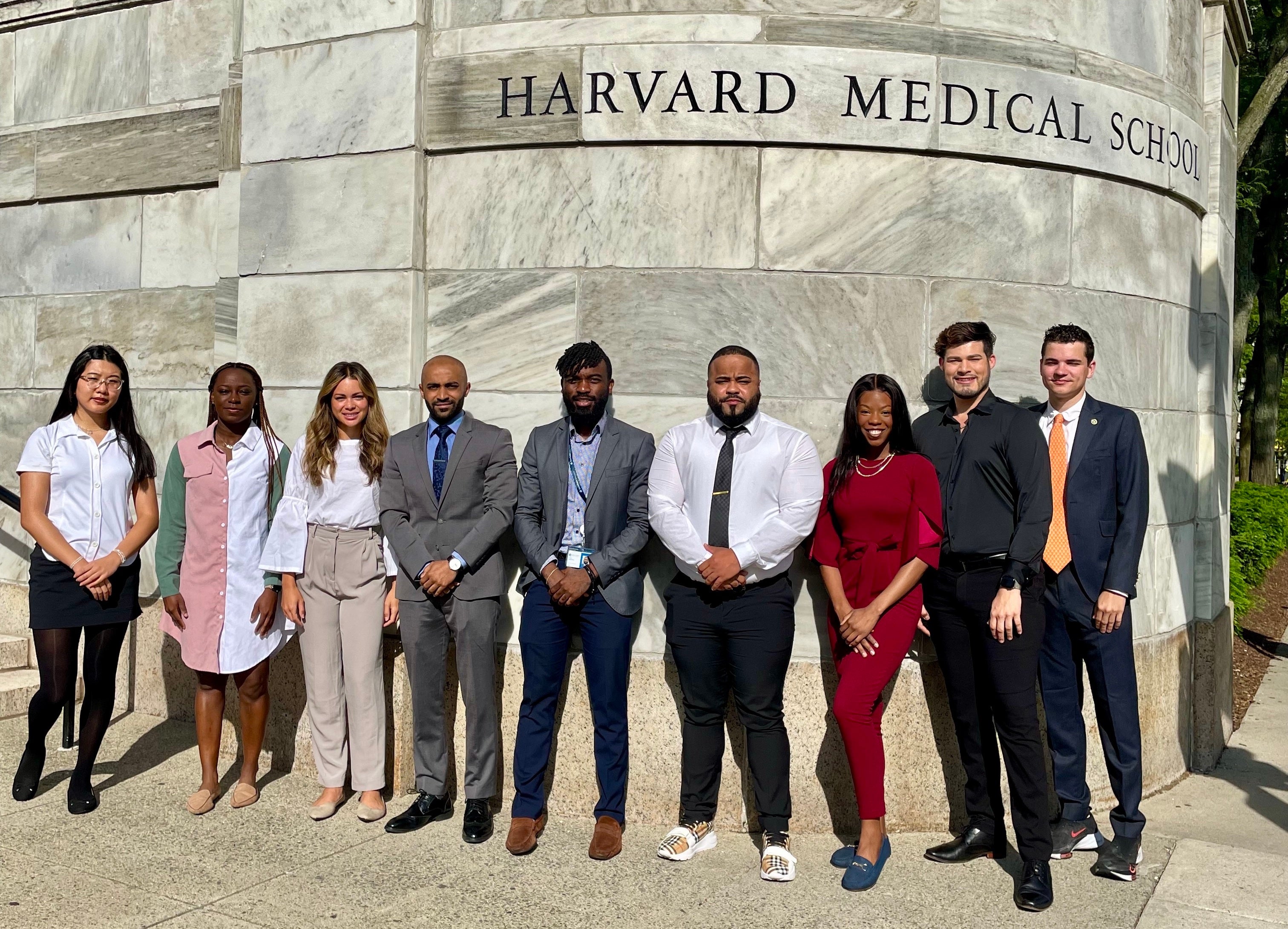News & Highlights
Topics: Clinical & Translational Research, Diversity & Inclusion, Education & Training, Mentoring
Visiting Medical Students Tackle Big Research Questions
Our annual internship program draws students from around the U.S. for a mentored clinical experience.

For most first- and-second year medical students, the chance to conduct real-world experiments, network with world-class researchers, and learn from Harvard faculty is only a dream. This summer, nine medical students have the opportunity to live that dream. This summer’s annual cohort of students won’t be spending this summer in their hometowns; instead, they’re currently paired with mentors across Harvard Medical School (HMS), learning firsthand the ins and outs of conducting clinical and translational research.
Launched in 2009, the Visiting Research Internship Program (VRIP) is an eight-week internship designed to foster interest in clinical and translational research careers and enhance diversity in the workforce by exposing underrepresented minority and disadvantaged students to a range of clinical research disciplines.
” VRIP is an eight-week internship designed to foster interest in clinical and translational research careers and enhance diversity in the workforce by exposing underrepresented minority and disadvantaged students to a range of clinical research disciplines.”
This year’s cohort of interns arrived on June 5 from a diverse range of states – Virginia, Tennessee, Minnesota, New York, Massachusetts, and Arizona, as well as Puerto Rico. Throughout the summer, the students will be tackling scientific challenges and diseases, learning research methods, taking part in Harvard Catalyst courses, meeting fellow researchers via networking events and seminars, and learning from Harvard faculty.
A foundational aspect of the program is working under mentors at laboratories at HMS, affiliated hospitals, and partner institutions. Faculty, many of whom return each year to mentor the students, are gifted with a diverse range of expertise and specialties, working at affiliates such as Brigham and Women’s Hospital (BWH), Boston Children’s Hospital (BCH), Harvard T.H. Chan School of Public Health, Dana-Farber Cancer Institute (DFCI), and Massachusetts General Hospital (MGH).
Under their guidance, the students will be busy conducting unique research projects.
For example, with the support of Edward Kenneth Rodriguez, MD, PhD, of BIDMC, Khadijah Jannah, a student from Meharry Medical College, is comparing outcomes and complication rates of long, short, and intermediate cephalomedullary nails when used to stabilize femur fractures. Under the mentorship of Jose Figueroa, MD, of BWH, Meharry Medical College student Orlane Caro is working on the first national and comprehensive study to assess changes in diabetes-related complications in the U.S. during the COVID-19 pandemic among older adults with diabetes.
And Vellia Zhou, of Tufts University, is exploring with mentor Ronald Arellano, MD, of MGH, the research question: “What is the diagnostic and therapeutic value of using an aspiration procedure to remove fluid from cystic renal masses found in those with kidney cancer?” Under the guidance of Charles R.G. Guttmann, MD, of BWH, University of Virginia medical student Garrett Arosemena is developing and applying methods to measure the dentato-rubro-thalamic tract (DRTT), the brain’s channel for regulating motor control. He will be studying patients with movement disorders both before and after MR-guided focused ultrasound (FUS) thalamotomy treatment, which uses focused sound waves to treat the brain with the hope of improving symptoms.
“A foundational aspect of the program is working under mentors at laboratories at HMS, affiliated hospitals, and partner institutions.”
Cancer research is the focus of Mayo Clinic Alix School of Medicine student Destiny Green. Her research involves investigating how retinoic acid affects the immune response of neuroblastoma cancer cell lines, a type of cancer that commonly affects infants and young children. Her goal is to support the development of advanced treatment options that specifically target the immune system. Rani E. George, MD PhD, of DFCI, serves as her mentor.
Under Meena Nathan, MD, of BCH, Rahim Hirani, a student from New York Medical College, is investigating trends in thromboelastography (TEG) values, a test that measures the ability of blood to form a clot. Hirani will test this based on the type of blood thinner used during extracorporeal membrane oxygenation (ECMO) when blood is pumped outside of the body to a heart-lung machine that removes carbon dioxide and sends oxygen-filled blood back to tissues in the body. Hirani is working to identify patterns of change in TEG values that may be associated with bleeding or thrombotic complications while on ECMO.
Additionally, Lashawn Peña of SUNY Downstate Health Sciences University is working with George Molina, MD, of BWH, to evaluate clinical factors associated with overall survival and recurrence among patients with pancreatic ductal adenocarcinoma, a malignant tumor of the pancreas, among those who have received surgery at BWH.
Those diagnosed with psychosis suffer from a mental disorder characterized by a disconnection from reality. Ponce Health Sciences University student Erik Velez-Perez is working with Paulo Lizano, MD, of BIDMC, to investigate retinal cell function among patients with schizophrenia with the goal of identifying biomarkers of illness progression and understanding broader aspects of this disorder.
Finally, under the guidance of Monique A. Hartley-Brown, MD, of DFCI, Atehkeng Zinkeng, from University of Arizona College of Medicine, is conducting a retrospective review of African American participation in key clinical trials supporting FDA Approval of CART Therapies and evaluating their performance in African American patients at DFCI.
At the end of the internship, students will submit an abstract to the 2024 New England Science Symposium and give an oral presentation on their research findings at a closing ceremony, which is open to the public, on July 27 at Harvard Medical School.

